Why I hope buying an RV saves travel for our family
Editor's Note
The last month has been a great personal experiment. I've flown to Florida twice, first for the Universal Orlando re-opening day and then stayed in a socially distanced Marriott Vacation Club. After watching COVID-19 cases skyrocket around the country since my trip to Florida, my risk tolerance for my typical travel patterns has rapidly decreased.
Looking forward to the rest of 2020, in my novice opinion, I don't see anything getting any significantly better nor do I see many countries allowing Americans to visit. With a 3- and 5-year-old in the house since March and prospects to get out the rest of the year dwindling, my family looked to alternative ways to hit the road again.
For more TPG news delivered each morning to your inbox, sign up for our daily newsletter.
That leads us to Betty: our new 37-foot Passport Grand Touring 3351BH bunkhouse floor plan travel trailer.
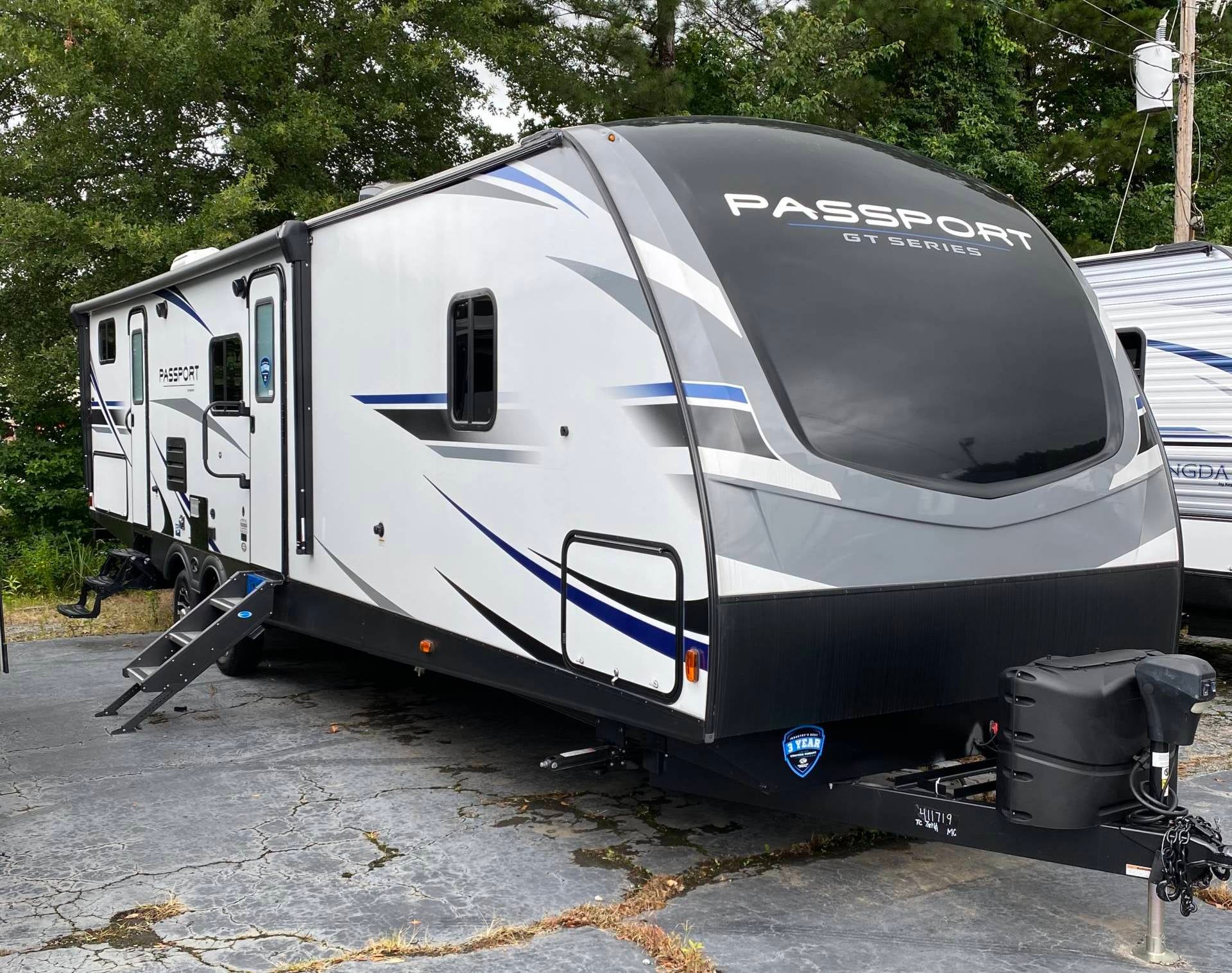
We took the plunge like thousands of Americans this year and are headed out on the road for a few week-long stints at a time. She's got a Wi-Fi extender for work, 1.5 bathrooms for kids and parents to have space (relatively speaking) and all kinds of bells and whistles to make the outdoors more comfortable.
Related: Best credit cards for gas purchases
The grand experiment
There's an overwhelming amount of information to try and absorb when it comes to the recreational vehicle world. Much like points and miles, you simply can't try and understand it all from the beginning. What's most important for my family is we understand this is a grand experiment that we're purposely undertaking due to COVID-19 preventing our typical work and travel patterns from happening.
Staying inside our house with a 3- and 5-year-old for multiple additional months simply isn't an option for our family and our circumstances. We figure this experiment currently has an equal chance of failure as it does success. But, at least we know there's a chance for success, whereas the expiration date for maintaining our sanity while sheltering in space has come and gone.
Related: 6 things you should know before you rent your first RV


This is a large financial investment that has no end in sight once you start looking at the true cost of ownership. Something is always going to break, campsites have to be paid for, there's routine maintenance, insurance, fuel and likely a steep learning curve along the way. There's also the liability of moving a rather large vehicle down the road at a high rate of speed with my family inside and everyone else out on the road.
Related: Best spots for glamping in the U.S.
But the upside here for our family is potentially tremendous. My kids really need a new environment at this point. Getting them outside (beyond our usual neighborhood spots) and letting their imagination and senses run wild will likely only benefit them -- and us -- in the long run. There are plenty of places to see and sights to explore, even close to home, as we set off nearby to get our feet underneath us. The second half of 2020 could be a time of great family memories and likely a few stories we'll tell for years to come.
As long as you have judiciously done your research, understand and then hedge against the risk, I say undertake your own great outdoor experiment.
Related: The best credit cards for purchasing a car
Why a travel trailer?
To keep it simple, you have three options when looking for an RV. A motorhome, "fifth wheel" tow-behind or travel trailer. Each has several positives and negatives. Our biggest requirements were the ability to stay mobile wherever we go and that I need a separate workspace away from the wife and kids during the day.
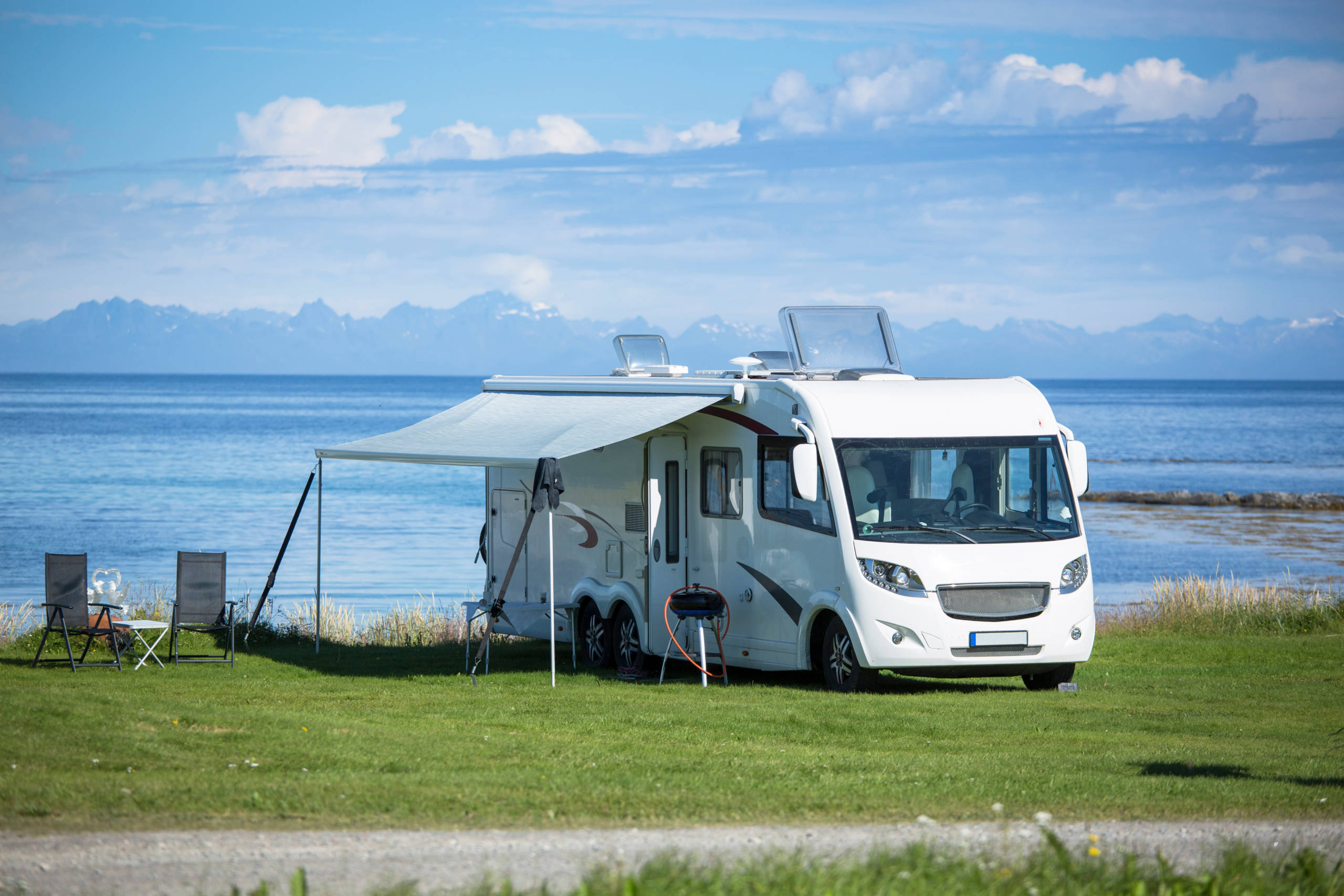
Motorhome: The living space sits on top of a motorized chassis. If you only have a motorhome, quick grocery store runs or a simple errand could be a hassle for everyone as you need to drive the whole big rig to the store. Many are very nice and spacious but they get expensive quickly, have a ton to maintain and -- to be mobile -- you need to tow a car (a toad) behind the motorhome. I am not comfortable towing 50+ feet down the road and then being limited to the destination by our size.
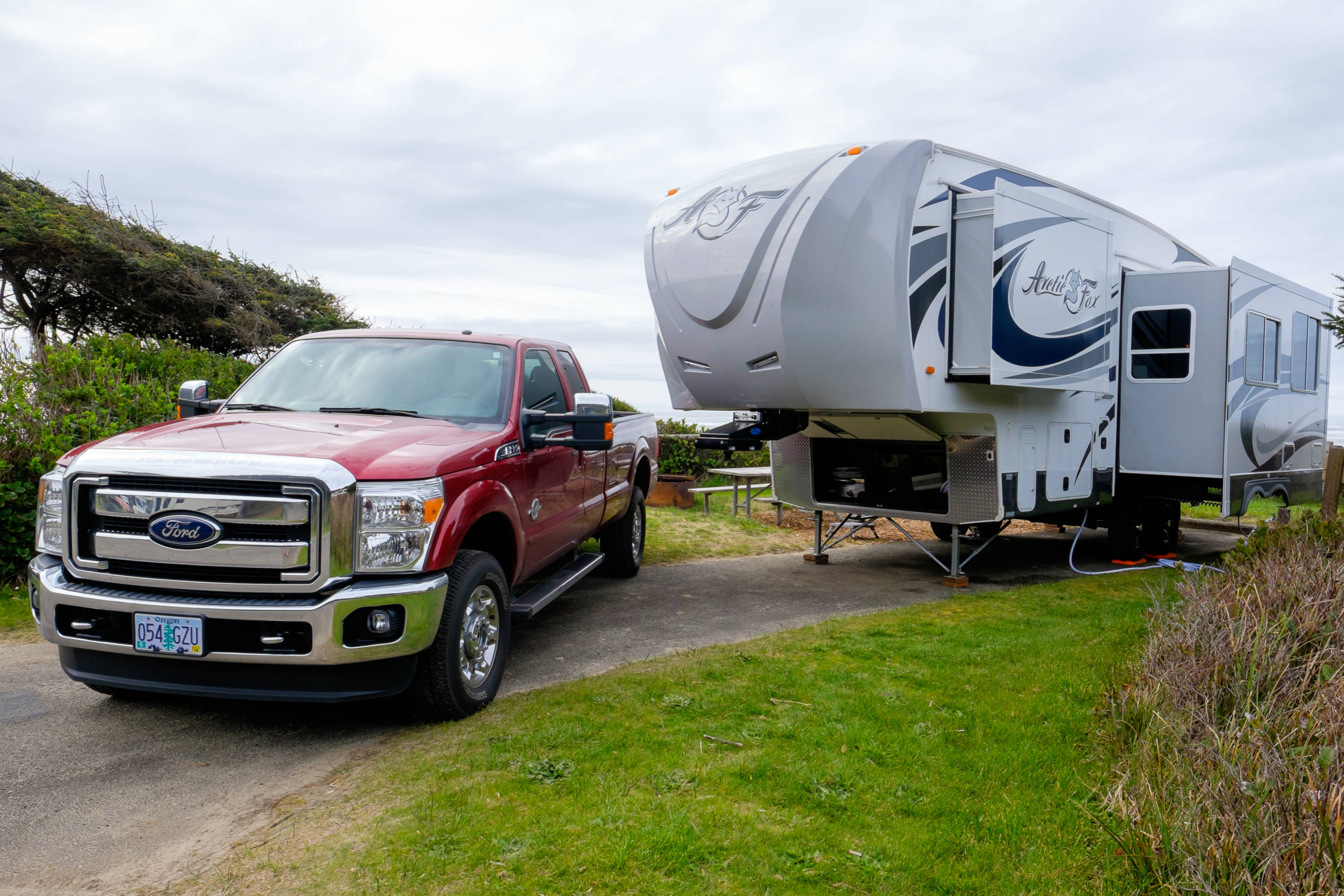
Fifth wheel: Named after the U-shaped hitch that sits in the bed of a truck, these large campers can be very luxurious, but they are big. A fifth wheel requires a three-quarter-ton truck to pull it. These large trucks are not particularly easy to explore a city or simply park in a regular parking space. Fifth wheels are a more expensive option all around.
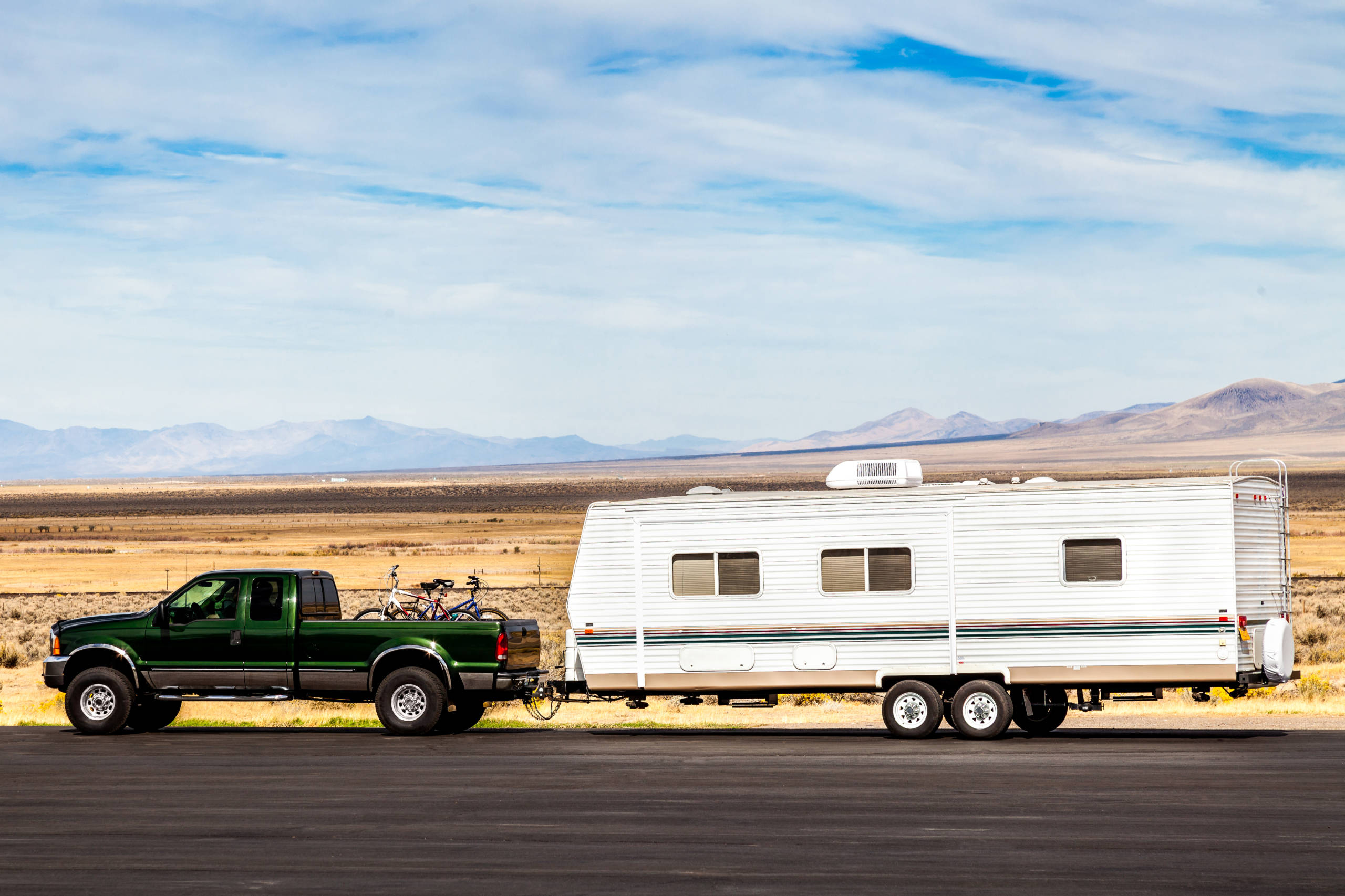
Travel trailer: These are lightweight trailers you pull behind a vehicle via a hitch. Most (but not all) are light enough for a half-ton truck to pull them. Once we are at a campsite, we can simply unhook the trailer and the wife and kids are free to explore the area in the more manageable Ram 1500 Ecodiesel truck we have to tow the trailer.
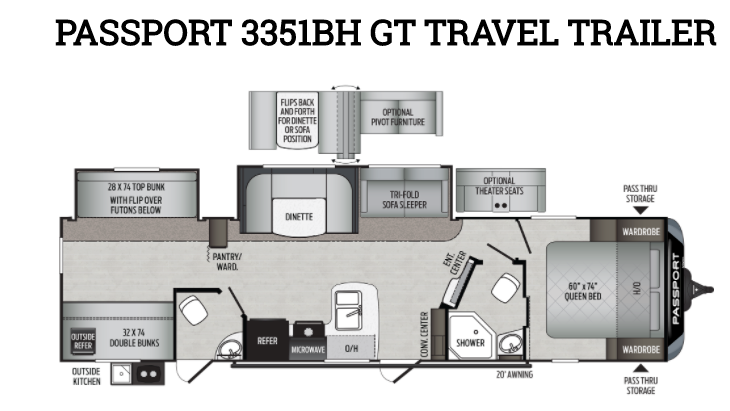
Travel trailers have great floor plans and as soon as we walked inside the 2020 Passport Grand Touring with 1.5 baths and a separate bunk room in the back, we knew we had found the one for us. I'll put a small desk and chair in the back room to work in during the day. The closing door allows my own space and the kids and wife to have the rest of the trailer to cook in, conduct virtual school or play games while I can have meetings and work in relative peace. At 7,000 pounds empty, it is well within the 10,000-pound towing capacity of our Ram -- even once loaded with cargo.
The final factor in our selection of a travel trailer is our potential plan to rent it out on platforms like RVshare and Outdoorsy. This has a whole other level of factors to consider before renting it out, but having a travel trailer that is towable by a half-ton truck widens our pool of potential renters considerably compared to a fifth wheel.
Related: Tips for your first RV rental
Points and miles while camping?
Many members of the TPG Lounge on Facebook have asked questions about maximizing points and miles towards an RV purchase or while camping. To be honest, the options are limited. I was able to put a 10% down payment on the trailer with a credit card but after that, I see little that can be done.
Some nationwide campgrounds, like KOA and Yogi Bear Jellystone parks, have rewards programs and there are different memberships you can buy like Passport America that save on campgrounds. Other than that, I haven't found much substance for points and miles yet. Credit card rental insurance doesn't cover RVs and I have not found a way to redeem points to cover campground fees.
I'll continue to focus my efforts on dropping the price of gas for my tow truck using programs like GetUpside and Fuel Rewards. When I do pay for gas, luckily there are a few limited-time offers giving bonus points for gas right now.
Related: We're exploring the country by RV for a year -- with four kids
Bottom Line
Our decision to jump headfirst into RV life came down to whether we sit and wait for the world to decide what we can do, or do we strike out and forge our path to reclaim travel. We are tired of sitting and waiting.
Will our travel trailer Betty yield great fun and adventure, or frustration and $$$ wasted? Probably both — either way, it'll be a good story and better than continuing to stare at the same four walls for an indefinite period of time.
TPG featured card
at Capital One's secure site
Terms & restrictions apply. See rates & fees.
| 5X miles | Earn 5X miles on hotels, vacation rentals and rental cars booked through Capital One Travel |
| 2X miles | Earn unlimited 2X miles on every purchase, every day |
Pros
- Stellar welcome offer of 75,000 miles after spending $4,000 on purchases in the first three months from account opening. Plus, a $250 Capital One Travel credit to use in your first cardholder year upon account opening.
- You'll earn 2 miles per dollar on every purchase, which means you won't have to worry about memorizing bonus categories
- Rewards are versatile and can be redeemed for a statement credit or transferred to Capital One’s transfer partners
Cons
- Highest bonus-earning categories only on travel booked via Capital One Travel
- LIMITED-TIME OFFER: Enjoy $250 to use on Capital One Travel in your first cardholder year, plus earn 75,000 bonus miles once you spend $4,000 on purchases within the first 3 months from account opening - that’s equal to $1,000 in travel
- Earn unlimited 2X miles on every purchase, every day
- Earn 5X miles on hotels, vacation rentals and rental cars booked through Capital One Travel
- Miles won't expire for the life of the account and there's no limit to how many you can earn
- Receive up to a $120 credit for Global Entry or TSA PreCheck®
- Use your miles to get reimbursed for any travel purchase—or redeem by booking a trip through Capital One Travel
- Enjoy a $50 experience credit and other premium benefits with every hotel and vacation rental booked from the Lifestyle Collection
- Transfer your miles to your choice of 15+ travel loyalty programs
- Top rated mobile app


